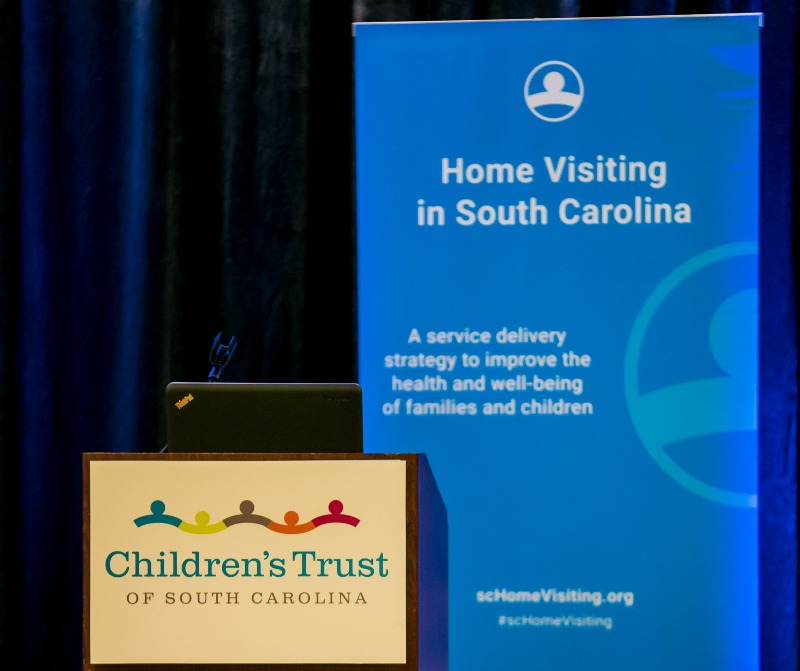Children’s Trust held its annual All Sites Assembly for home visiting grantees in a September virtual event.

The past 18 months have presented many challenges for home visitors in South Carolina as they work to improve maternal and child health during the COVID-19 pandemic.
The ongoing issues related to the virus – which include a recent spike in cases and deaths – continue to affect how services are delivered. They also had an impact on the September gathering of home visitors, the annual All Sites Assembly hosted by Children’s Trust. Instead of a planned in-person conference, the event became a virtual one to ensure the safety of participants.
As South Carolina’s lead agency for the Maternal, Infant and Early Childhood Home Visiting (MIECHV) federal grant since 2010 through funding from the U.S. Health Resources and Services Administration’s Maternal and Child Health Bureau, Children’s Trust supports three evidence-based home visiting models – Healthy Families America, Nurse-Family Partnership, and Parents as Teachers – in partnership with 16 implementing agencies in 40 counties.
The conference mirrored the recent work of home visitors, who have used virtual visits to continue their interactions with families. Home visitors – who can be nurses, social workers, or child development specialists – support preventive health and prenatal practices, help parents understand developmental milestones, promote the use of positive parenting techniques, and work with caregivers to set goals for the future, continue their education, and find employment and child care solutions.

Cathy Ramage
Cathy Ramage, Children’s Trust director of home visiting, welcomed the 100 MIECHV home visitors attending the conference with words of encouragement and admiration for how they’ve kept providing resources and supports for families despite the many obstacles.
“The circle of life goes on, which is really the core truth that home visiting is based on – families are made and growing every day, in every circumstance, regardless of the environment, political climate, community context, family context, and public health context,” Ramage said.
“And I’m really grateful on a personal level to be in some small way a part of what helps make the work you all do possible because it’s given me some hope through this very tough past year-and-a-half. You all are part of the good in the world, the resilience, the supports, the resistance to cynicism and the status quo. You help to unleash and empower untapped potential; you are the antidote to the effects of this virus for the families and communities you serve.”
She added that home visitors can also be a buffer from issues like isolation, mental health, and overcoming barriers that exist to accessing concrete supports.
The All Sites Assembly is an opportunity for home visitors to come together for shared learning each year in a creative and collaborative atmosphere. The event also aims to be a positive, uplifting experience that gives home visitors the opportunity to reenergize personally and recharge their batteries.
Along with the many workshops offered, the event featured three keynote speakers who addressed various aspects of home visiting.

Shannon Queiroga
Shannon Queiroga, a licensed professional counselor and the national training director for Child First, spoke to the importance of home visitors providing hope during the pandemic. She showed a graphic with this message: “We are not all in the same boat. We are all in the same storm,” and she discussed how everyone’s boat is different while all are trying to navigate the COVID storm.
Every family may face different circumstances as it relates to employment, housing stability, economic situation, and managing the schedules of all family members. The role of home visitors remains a crucial one, she noted, regardless of the model, and they also may be working with fewer resources and have less emotional bandwidth of their own. While navigating the pandemic in the face of increasing uncertainty, she stressed the need to practice self-care while holding onto hope.

Jennifer Wilder
Jennifer Wilder, primary prevention services coordinator with the Connecticut Office of Early Childhood, shared tips and tools to support engagement, enrollment and retention of fathers and positive male figures in the home visiting field. She noted that home visiting is a challenging female-dominated field and how difficult it can be to find and retain men with the skills to do this work.
She also discussed how it’s crucial to engage fathers in the home as part of the home visiting work, whether that’s supporting them in finding employment, continuing their education, or connecting with their children in meaningful ways.
Dr. Nakeitra Burse, the owner and CEO of Mississippi-based Six Dimensions, closed out the event with a keynote that spoke to addressing Black maternal health through community-based strategies.

Dr. Nakeitra Burse
With a focus on addressing racial biases that create health disparities and inequities in health care systems, she wants to advance changes that can have a positive impact on health outcomes, particularly in Black communities. Black women are dying at much higher rates due to birth-related complications, and Burse understands how home visitors can play a significant role in supporting prenatal and postpartum care for the mother and child. She saluted the attendees for their efforts in this area.
“Continue to move forward and continue to do the amazing work that has such an impact,” she said.
For Ramage, the role of Children’s Trust will continue to be providing funding, coaching and administrative support to the home visiting field, especially during this pandemic.
“I’m excited about many of the efforts taking place in South Carolina more broadly to collaborate, connect around data, and advance not only home visiting, but early childhood systems,” Ramage said. “But I’m most excited to have the privilege of continuing to help coordinate this initiative and support the work you all do. Because it’s things like the work that are going to get us as a society through this pandemic, that are going to get us through future challenges, and keep working towards a better world for all of us.”




